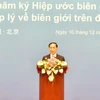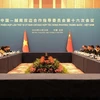State President Nguyen Minh Triet agreed on Jan. 6 to support Binh Phuoc province in its request for use of the state budget for electricity grids in minority-inhabited areas even though the poverty rates in these localities are not high.
The southwestern province’s poverty rate in 2009 was reduced to 4.79 percent, while recent regulations only allocate state funding for power development to areas with a poverty rate of more than 50 percent.
Without the state support, electricity distribution in Binh Phuoc remains sparse because companies are reluctant to invest in constructing more electricity grids in remote areas because of profit reasons.
During the meeting with leaders from Binh Phuoc addressing the province’s socio-economic developments in 2009, the State President also promised to ask the government to assist the province in building roads to border guard posts.
He was asked to urge the government, ministries and agencies to negotiate with Cambodia and Laos for a joint agreement on transportation, trade and tourism in order to facilitate free flow of trade and promote economic, cultural and tourism cooperation among the three countries.
The provincial authorities also proposed to quicken construction of the trans-Asia railway and asked for permission to build a railway route from the Central Highlands to Ho Chi Minh City through Binh Phuoc’s territory.
Binh Phuoc officials requested the President to grant them the power to support Cambodian provinces bordering Binh Phuoc in infrastructure development.
After the meeting, President Triet visited the Hung Nhon joint-stock company, attended the signing ceremony between the Binh Phuoc provincial People’s Committee with the Vietnam Rubber Industry Corporation and Mai Linh Group, and attended a music show raising money for the poor and disabled, orphans and victims of Agent Orange/dioxin./.
The southwestern province’s poverty rate in 2009 was reduced to 4.79 percent, while recent regulations only allocate state funding for power development to areas with a poverty rate of more than 50 percent.
Without the state support, electricity distribution in Binh Phuoc remains sparse because companies are reluctant to invest in constructing more electricity grids in remote areas because of profit reasons.
During the meeting with leaders from Binh Phuoc addressing the province’s socio-economic developments in 2009, the State President also promised to ask the government to assist the province in building roads to border guard posts.
He was asked to urge the government, ministries and agencies to negotiate with Cambodia and Laos for a joint agreement on transportation, trade and tourism in order to facilitate free flow of trade and promote economic, cultural and tourism cooperation among the three countries.
The provincial authorities also proposed to quicken construction of the trans-Asia railway and asked for permission to build a railway route from the Central Highlands to Ho Chi Minh City through Binh Phuoc’s territory.
Binh Phuoc officials requested the President to grant them the power to support Cambodian provinces bordering Binh Phuoc in infrastructure development.
After the meeting, President Triet visited the Hung Nhon joint-stock company, attended the signing ceremony between the Binh Phuoc provincial People’s Committee with the Vietnam Rubber Industry Corporation and Mai Linh Group, and attended a music show raising money for the poor and disabled, orphans and victims of Agent Orange/dioxin./.



















